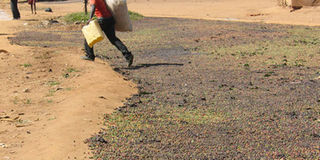Farmers’ body wants tough coffee laws

It is proposed that farmers who dry coffee on bare ground can be sued. PHOTO BY MICHAEL J SSALI
Following formulation of the National Coffee Policy in 2013, the farmers, under the National Union for Coffee Agribusiness and Farm Enterprises (Nucafe), are engaged in a fresh effort to ensure it is implemented to increase coffee production and improve competitiveness on the international market.
The farmers are of the view that the existing regulations, mainly controlled by Uganda Coffee Development Authority (UCDA), have limitations. Therefore, the need for a new law to streamline production and marketing. They also claim 87 per cent of the coffee farmers are not even aware of regulations such as The Uganda Coffee Development Authority Statute 1991, and The Coffee Regulations 1994.
In addition, lack of effective regulation has caused coffee production to stagnate at an average of three million 60kg-bags annually, which has minimised farmers’ earnings. They are also seeking amendment of the UCDA statute in order for the authority to play its role more aggressively.
“We were the key players in influencing the government to formulate the National Coffee Policy,” said Joseph Nkandu, executive managing director, Nucafe. “This is the first ever public policy in Uganda directly influenced and demanded by farmers. Hence, collectively we own the vision and process of the policy. We now want to ensure that its implementation addresses all the positive changes that we want to see in the coffee sector.”
To advocate from an evidence-based position, Nucafe has solicited for funding from Technical Centre for Agriculture and Rural Co-operation (CTA) and Eastern Africa Farmers Federation (EAFF) and commissioned a research to get farmers’ views on existing coffee laws and regulations.
It also sought to establish the current impact, positive or negative, of having the UCDA Statute as the coffee law of Uganda and whether the current UCDA coffee regulations are enforceable and cannot be challenged in courts of law.
In July, , Nucafe organised a coffee farmers’ forum in Masaka for the central region. It was to collect views and to share research findings. “We are to hold such forums in all coffee growing regions of the country,” Nkandu said.
Quality and competitiveness
The research indicated that the regulations have gaps and weaknesses much as UCDA has registered successes in developing the sector.
“For instance, the regulations emphasise only marketing and quality control. They leave out key coffee value chain areas that greatly impact on the growth of the sub-sector and competitiveness of coffee on the international market. Such areas include: research, nursery operation, production and consumption. They also leave out the area of extension service provision, input supply, and financial services,” explained Sarah Tibaidhukira Kayaga, who led the research team.
Nkandu pointed out that if a farmer picks green coffee or dries coffee on bare ground which are some of the bad practices that compromise quality and competitiveness on the international market, such a farmer cannot be successfully prosecuted because there is no law on such issues. “This is the reason we are struggling to ensure their inclusion in the implementation of the National Coffee Policy.”
The farmers also want registration of coffee buyers so that strict measures are set.
Among others, the report recommends that in order to enhance productivity and competitiveness of Uganda coffee, the law and regulations should be applied to all the value chain areas. “This is because a failure of or weakness in one value chain area will impact on the coffee productivity and competitiveness,” it reads in part.
Another recommendation is that a minimum premium price be set and that traders pay the farmers as per quality and grade.
At the Masaka forum, several farmers questioned the quality of seedlings distributed by politicians. They also recommended that nursery owners/operators be trained and certified. “Some nursery owners don’t have mother gardens and are not even registered but they sell seedlings,” remarked Nalongo Nsumba from Kabonera Sub-county, Masaka District.
Rashida Nakabuga, from Nucafe Secretariat, told the forum, “We want the implementation of the National Coffee Policy to include equal sharing of opportunities by both men and women. The involvement of women and youths at all levels has been minimal as shown by different households and association-level gender analysis that we carried out.”




